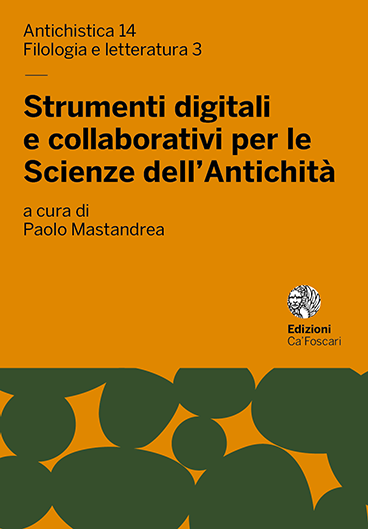Series |
Antiquity Studies
Volume 14 | Edited book | Digital and Collaborative Tools for Antiquity Studies
Digital and Collaborative Tools for Antiquity Studies
open access-
edited by
- Paolo Mastandrea - Università Ca’ Foscari Venezia, Italia - email
Abstract
The book is the outcome of an international study conference held at Ca’ Foscari University in 2014 and is intended as a moment of reflection on the digitisation and research work carried out at an academic level on materials and texts related to the Sciences of Antiquity. The contributions it contains respond to the need to compare experiences gained in apparently distant disciplinary fields (from archaeology to epigraphy, from ancient and pre-modern literature to Roman law) but which share significant points of contact. The aim is to identify new lines of research in interdisciplinary collaboration, capable of extending the potential of current automated systems of investigation.
Keywords Lexicography • Named entities recognition • Europeana • Medieval epigraphy • Greek inscriptions • Nuovo soggettario • Perception • Prehistory • English literature • Semantic web • Ecdotics • WordNet • Digital library • Text • Juridical protection of data • Latin inscriptions • Translations • Glyphs • Integration • Ontology • Archaeology • Digitalization • Subject indexing • Geography • Resource discovery • Digitality • Database • Linked Open Data • Digital thought • Hermeneutics • Classical Languages • Grammar • Classical philology • Perseus • Greek epigraphy • Digital philology • OWL • Digital libraries • Thesauri • Ancient Greek Wordnet • Semantic Web • Allusion • Collaborative and cooperative philology • Information retrieval • Intertextuality • Copyleft • Digital Library • Narrative • Open Access • Digital Libraries • Open data • Literary epigrams • Ontologies • RDF • Semantic network • Latin literature • Scholarly primitives • Standards • Medieval palaeography • Text reuse • Latin epigraphy • Greek literature • Copyleft and public domain • Semantic annotation • Semantic search • Meno’s Paradox • Creative commons • Database protection • Copyright • Humanities computing • Dictionaries • Poetic memory • Digital humanities • Research infrastructure • Digital archives • Classical studies • Re-use • Project building • Perseus Digital Library • XML-TEI encoding • Late antiquity • NLP • The Time theme • National libraries
Permalink http://doi.org/10.14277/978-88-6969-182-9/ANT_14 | e-ISBN 978-88-6969-182-9 | ISBN (PRINT) 978-88-6969-183-6 | Published Nov. 29, 2017 | Language en, it
Copyright © 2017 Paolo Mastandrea. This is an open-access work distributed under the terms of the Creative Commons Attribution License (CC BY). The use, distribution or reproduction is permitted, provided that the original author(s) and the copyright owner(s) are credited and that the original publication is cited, in accordance with accepted academic practice. The license allows for commercial use. No use, distribution or reproduction is permitted which does not comply with these terms.
Testi introduttivi
- Presentazione
- Nov. 29, 2017
- Considerazioni introduttive
- Nov. 29, 2017
Costruzione e gestione di corpora e piattaforme digitali
- Alcune note di ecdotica digitale nella prospettiva della filologia collaborativa e cooperativa
- Nov. 29, 2017
-
Le sfide di una biblioteca digitale del latino tardoantico
Struttura, canone e questioni aperte di codifica e visualizzazione - Nov. 29, 2017
- Epigrafia digitale o digitalizzazione delle epigrafi?
- Nov. 29, 2017
Parte 2. Strumenti di ricerca semantica e per la critica testuale
-
Dal Thesaurus di BIA alle ontologie di BIA-Net
Prospettive di sviluppo e integrazione con altre basi di conoscenze - Nov. 29, 2017
- WordNets per lingue classiche
- Nov. 29, 2017
-
Didattica e risorse digitali
Appunti per un percorso sul tema ‘tempo’ - Nov. 29, 2017
Parte 3. Profili organizzativi e giuridici
- La protezione dei dati negli archivi digitali
- Nov. 29, 2017
-
The Tesserae Project
Detecting Intertextuality of Meaning and Sound - Nov. 29, 2017
Parte 4. Una Tavola rotonda: verso la biblioteca digitale antichistica
- Oltre le biblioteche digitali
- Nov. 29, 2017
-
Biblioteche digitali e specialisti del mondo antico
Collaborazioni nell'ambito dell'indicizzazione e della ricerca semantica - Nov. 29, 2017
- Nota conclusiva
- Nov. 29, 2017
